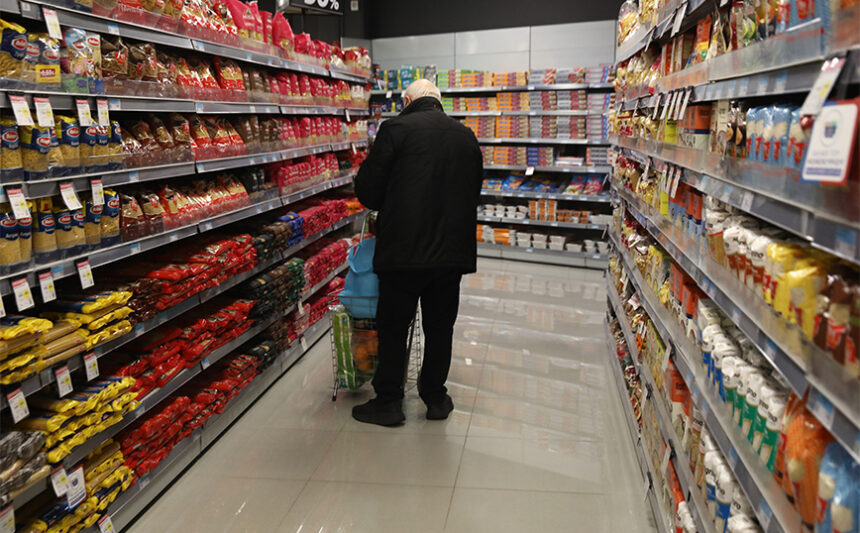Consumers will identify them by the special mark that will carry specific markings and specifications
“Flesh and bones” take the measures of the Ministry of Development in the battle against punctuality, with the direct aim of supporting the Greek family against the inflationary crisis.
Consumers are gradually finding on supermarket shelves the special marking for the products that will have a discount for six months while, according to the data available so far, 300 codes participate in the new “Permanent Price Reduction” initiative, with reductions starting from 5 % and reach up to 23%.
“With the “Permanent price reduction” initiative, we aim to permanently reduce the prices on the shelf, in items of basic necessity for households. We continue the effort to support the Greek family in the face of punctuality, implementing pioneering measures throughout Europe. At the same time, we are creating conditions for the immediate strengthening of healthy competition while we continue the intensive controls to crack down on profiteering,” recently stated the Minister of Development, Kostas Skrekas.
The development minister said that despite the high prices there are offers and invited consumers to use the e-katanalotis tool, which displays product prices in real time. At the same time, he emphasized that multinational companies are being checked for their profit margins, while a study is also being conducted to establish which products, sold in the Greek market, have a big difference on the shelf compared to the other EU countries.
It is noted that the fines imposed so far in 2023 amount to 5.5 million euros, while the Ministry of Development is conducting checks on over 5,000 product codes.
The participation of suppliers in the measure is gradually increasing
At the same time, the participation of businesses in the measure of permanent price reduction is small, however, the optimism of the Ministry of Development for expanding the list in the coming weeks and further increasing the codes is widespread. “Our goal is to exceed 500 codes,” said Minister Skrekas in his statements.
On the same wavelength, the general manager of the Union of Supermarkets of Greece, Apostolos Petalas, speaking to the Athenian-Macedonian News Agency, expresses his optimism that the goal set by the Ministry for the 500 codes will be far surpassed. In particular, he emphasizes that “it is very encouraging that the codes are constantly increasing, which proves the positive attitude of businesses. Given that all companies participating in the initiative will have to send the written commitment to the Ministry of Development by November 30, 2023, we expect greater participation from both Greek and multinational companies in the next period. The minister has set the bar at 500 codes. Logically, this goal will be exceeded by a long way.”
At the same time, the organized retail trade, according to Mr. Petalas, is ready to take any initiative it can within the framework of the implementation of the legislation. In this context, the supermarkets have acquired the special signs which they gradually place in the stores in order to inform the consumers. “Whatever the state institutes for the good of consumers, all supermarket businesses will implement it,” points out Mr. Petalas and adds that the Union encourages any such initiative. “All we ask is that it be done in an efficient way and not particularly bureaucratic that can lead to increased operating costs and possibly errors,” he points out.
In more detail, according to the data available until October 23, the companies participating in the measure are the following: Olympos (19 codes), Giotis (23 codes), Louli Mills (12 codes), Trikki (6 codes), Numil Hellas ( 17 codes), Palirroia (12 codes), Halvatzis Makedoniki (2 codes), Violanda (8 codes), Karamolegos (2 codes), Multi Foam (4 codes), Euricom (2 codes), Procter & Gamble (71 codes), Melinda (2 codes), Arla (7 codes), Mandrekas (2 codes), Flos (4 codes), Delta (20 codes). The products affected by the price reductions are, among others, flour, cold cuts, honey, milk, biscuits, rice, cheese, yogurt, ready meals, baby food, juices & drinks, personal hygiene items and detergents.
It is noted that the companies that will participate in the “Permanent Price Reduction” initiative will have to send the written commitment to the Ministry of Development by November 30, 2023. The shelf price on 9/19/23 will be taken as the reference price to calculate the reduction. It is also stipulated that supermarkets should place on the shelf with the reduced price products a special sign that will bear specific markings and specifications. Supermarket chains have 25 days from the moment the supplier notifies them of the price reduction to place the special label on the shelf. In the event that a company falsely declares that it has reduced its price, the competent agency for imposing sanctions is the Inter-agency Market Control Unit (DIMEA).
Regarding the other measures which will start to be implemented immediately, supermarkets with an annual turnover of more than 90 million euros are obliged to send the Ministry of Development notices of any price increase concerning basic products. The obligation concerns 59 product categories. Notices for any price increase will be sent to the Ministry of Development every Tuesday, until 3:00 p.m. In case the debtor conceals, falsifies or does not provide the data, a fine of 50,000 euros is imposed by DIMEA.
Also, supermarket businesses are required to send indicative sales prices of fruit and vegetable products to the Ministry of Development. The announcements of the indicative retail sales prices of fruit and vegetable products will be sent every Tuesday, at 09:00 through the digital platform e-katanalotis.gr, while the Ministry of Development can announce the range of prices prevailing in stores either through the digital platform e- katanalotis, or on the website of the General Secretariat of Commerce.








